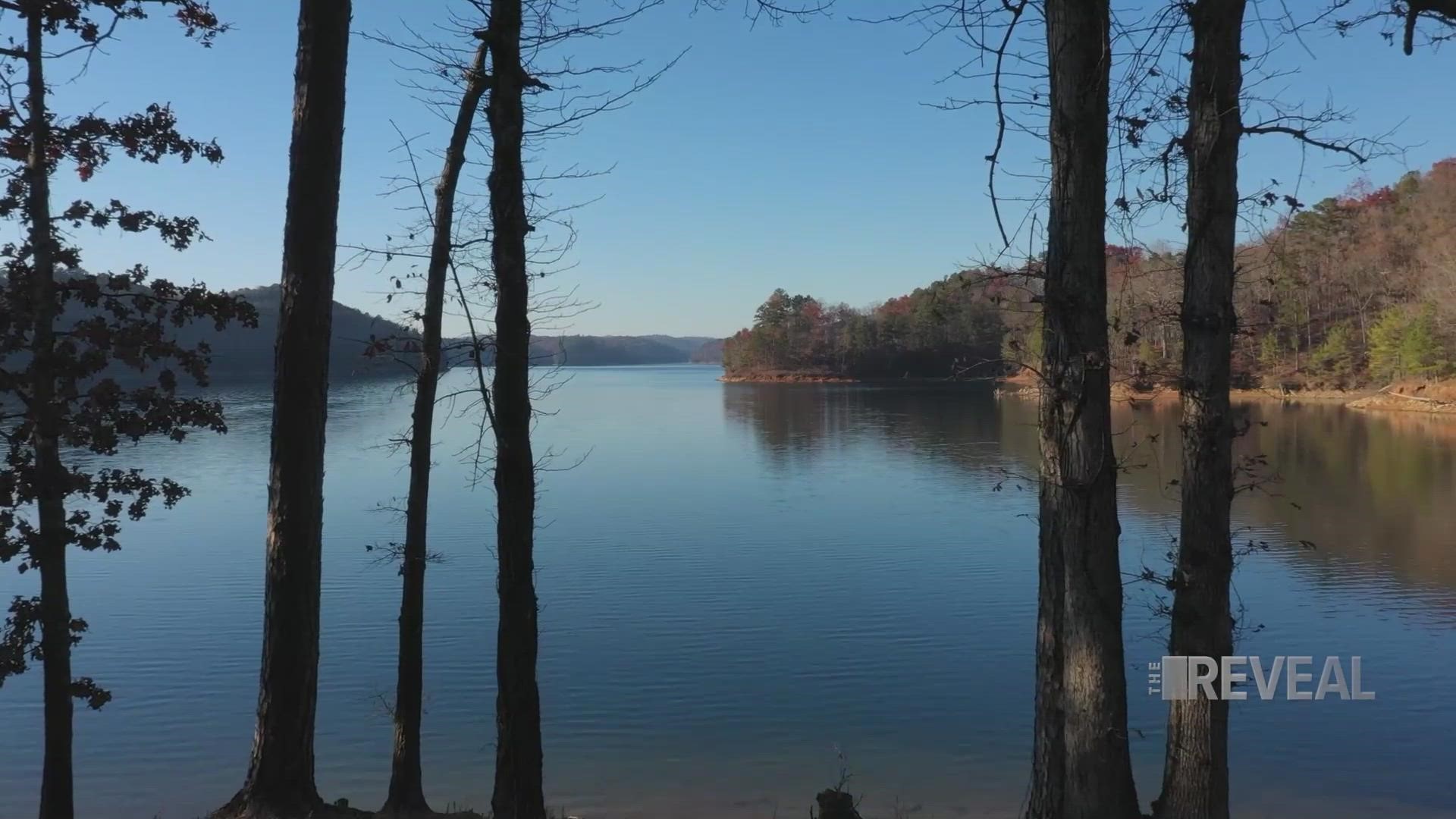GILMER COUNTY, Ga. — A Reveal investigation has uncovered a north Georgia water utility is accepting millions more gallons of waste water than allowed without state mandated permits. Two landfills, with a history of state violations, deposited the waste with the utility’s permission for years. Now, residents and advocacy groups are concerned about the potential environmental impact.
On the deepest lake east of the Mississippi, the fishing is best when the weather is at its worst, at least according to Al Stone.
“This is a famous lake for spotted bass,” he said during an interview on his boat, floating on Carters Lake in late November.
Stone routinely catches striped bass and walleye on the lake, about 80 miles north of Atlanta. He loves to eat fish but that may soon change after what The Reveal uncovered a few miles away.

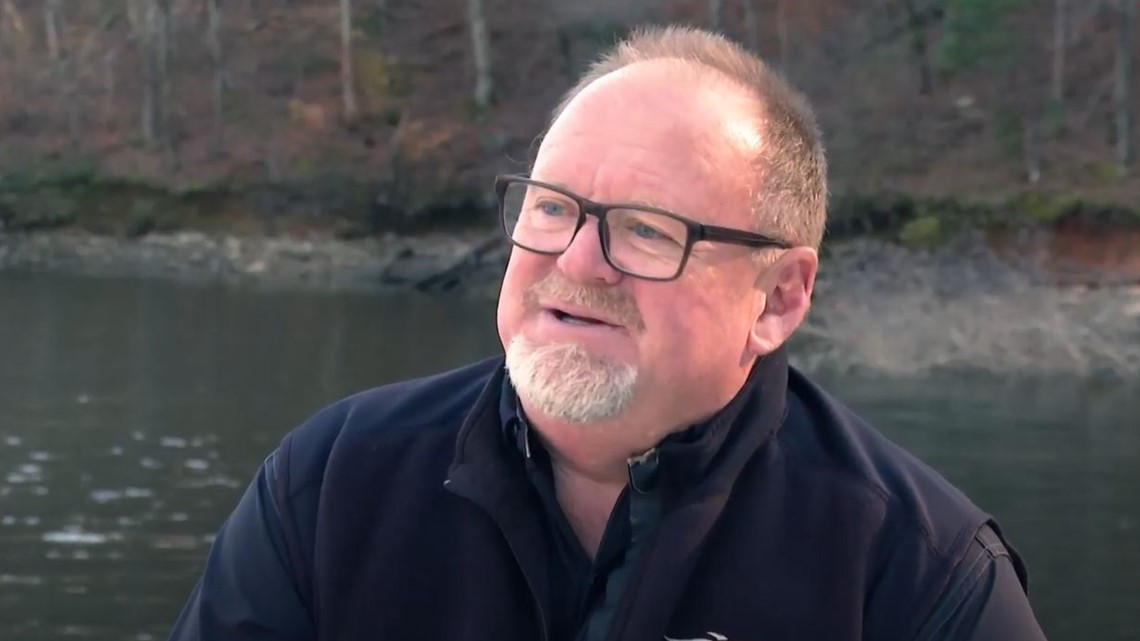
“You would think up here in the middle of this beautiful place that we'd be able to eat walleye and eat the striper in this beautiful clear lake, but what's upstream from here is a real problem,” explained Stone, who is also the founder of Environmental Defense of Georgia (EDOG), a group of farmers and residents concerned with water quality issues in Gordon County.
Stone’s concern is focused on a water treatment plant operated by the Ellijay Water and Sewer Authority (EGCWSA) in Gilmer County. It discharges into the Coosawattee River, which feeds into Carters Lake.
What we uncovered
A Reveal investigation found that plant officials have allowed landfills to deposit millions of gallons of waste into the facility without state mandated permits. The waste is landfill leachate, created when rain water passes through trash and collects underground.
According to records obtained by The Reveal from the water authority, the Pine Bluff and Eagle Point Landfills deposited 125 million gallons of leachate at the plant since 2018. That’s about 48,000 gallons a day each and nearly twice as much as the state allows without permits.
Four other landfills deposited their leachate during that time as well; one them from as far away as Alabama. In all, EGCWSA treated at least 133.5 million gallons of the waste and collected $4.8 million from landfill operators.
To put that in perspective, the treatment plant accepted more leachate than nearly two dozen others surveyed by The Reveal in north Georgia combined. EGCWSA was also the only utility surveyed that charged The Reveal for its public records, which cost $467.

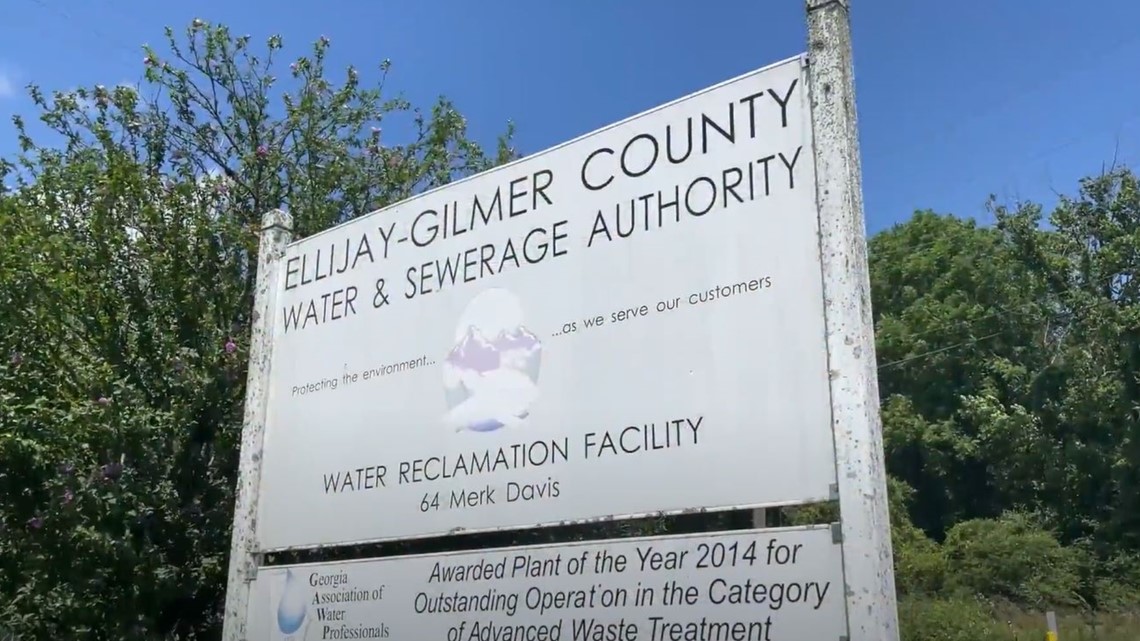
Because the landfills did not have permits, the water authority failed to perform annual inspections as required under its local pretreatment program and even failed to notify state officials.
The Georgia Environmental Protection Division (EPD) allows waste water plants to treat leachate, but it must issue pretreatment permits to significant industrial users if they deposit more than 25,000 gallons a day. The state gives water utilities authorization to issue these permits if they have an approved local pretreatment permit program, meaning they would be required to inspect industrial users and notify the state annually.
According to the Coosa River Basin Initiative, an environmental advocacy group, the numbers uncovered by The Reveal are concerning.
“It's alarming to see such a relatively small wastewater treatment plant taking on a very difficult to treat waste stream without the proper oversight,” the organization’s executive director, Jesse Demonbreun-Chapman, said.

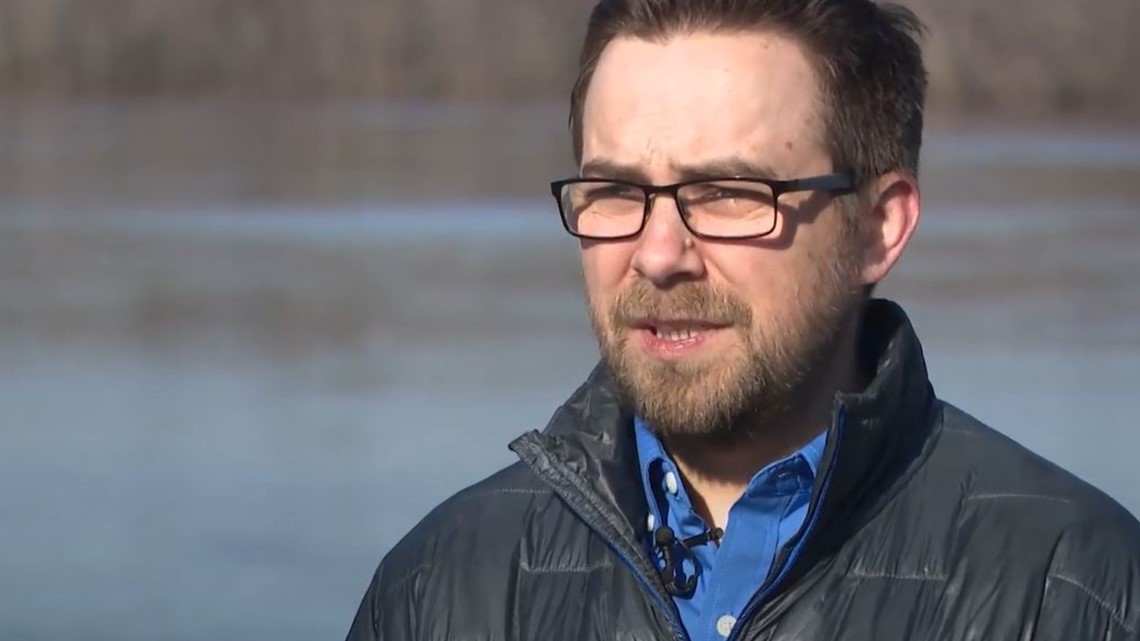
Waste Management owns and operates the Pine Bluff and Eagle Point landfills, which are about 45 minutes from the water treatment plant in question.
Both have a history of mishandling their leachate collection. According to EPD, the landfills were cited for uncontrolled leachate outbreaks in 2019 and 2020. State inspectors even identified some of the so-called ‘witches brew’ reaching a nearby river.
The operators paid more than $200,000 each in fines to the state and promised to fix the problems.
RELATED: Cancer causing chemical found in Ga. drinking water remains unregulated five years after EPA warning
Why leachate is such an issue
Multiple studies show leachate often contains elevated levels of a group of chemicals called perfluoroalkyl, or PFAS. Scientists call it the ‘forever chemical’ because it does not break down naturally. The compound is also linked to liver damage, birth defects and cancer.
According to the Environmental Working Group, a nonprofit advocacy group, PFAS is found in more than 2,300 locations across the country.
It has also been the subject of multiple lawsuits and congressional hearings. Last year, chemical companies agreed to pay $4 billion to address future PFAS litigation.
“Drinking this in the water was linked to six different serious diseases including two types of cancer,” said Robert Bilott during a 2019 hearing in front of the House Oversight Committee titled, ‘The Devil They Knew.’ Bilott is an attorney who has filed numerous lawsuits against the chemical companies that first manufactured and distributed the chemical.
Most water treatment plants do not regularly test or have the technology to remove PFAS before releasing it into lakes and streams. EGCWSA declined to tell The Reveal whether it does either one.

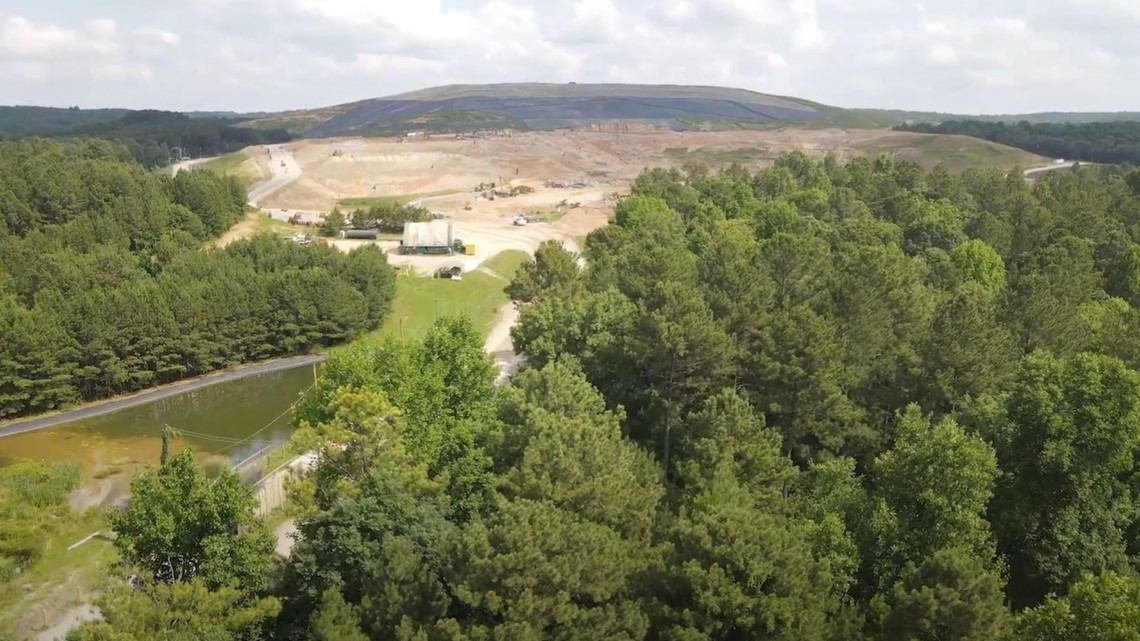
The response from the state
The Reveal requested an interview with plant officials three times since November. “The Open Records Act does not require the answering of any of questions and my client declines to do so at this time,” James Balli, an attorney representing the water authority said.
“These are important waterways that are on the receiving end of wastewater discharge not being treated in a manner that's removing these emerging contaminants,” Demonbreun-Chapman explained. “We started this conversation off with, ‘It's got to go somewhere,’ but it has to be done the right way.”
In response to The Reveal’s findings, EPD sent a letter to the water authority on Dec. 14 indicating the landfills were discharging more than allowed.
“Based on the provided records, the Division has tentatively determined that both the Eagle Point MSWL and the Pine Bluff MSWL may each be considered a SIU (Significant Industrial User)….thus requiring issuance of a pretreatment permit for each facility,” Mick Smith, the district manager for EPD’s Mountain District Office wrote in the letter.
Balli then responded on behalf of the EGCWSA, saying “[T]he Authority does not believe that Eagle Point or Pine Buff meet the definition of a SIU (Significant Industrial User).”
A spokesperson for the EPD said the state disagrees.
While financial penalties against water utilities are rare, fines could run up to $50,000 a day for EGCWSA. The EPD said Waste Management does not face any violations.
The state also added that the authority could issue pretreatment permits to the landfills by April.
In the meantime, Stone hopes the state holds EGCWSA accountable because he believes Georgia’s environment could be paying the price.
“If you keep putting this stuff in the environment, not only is it not healthy for us, but those who come behind us, because this stuff isn’t going away,” he added.

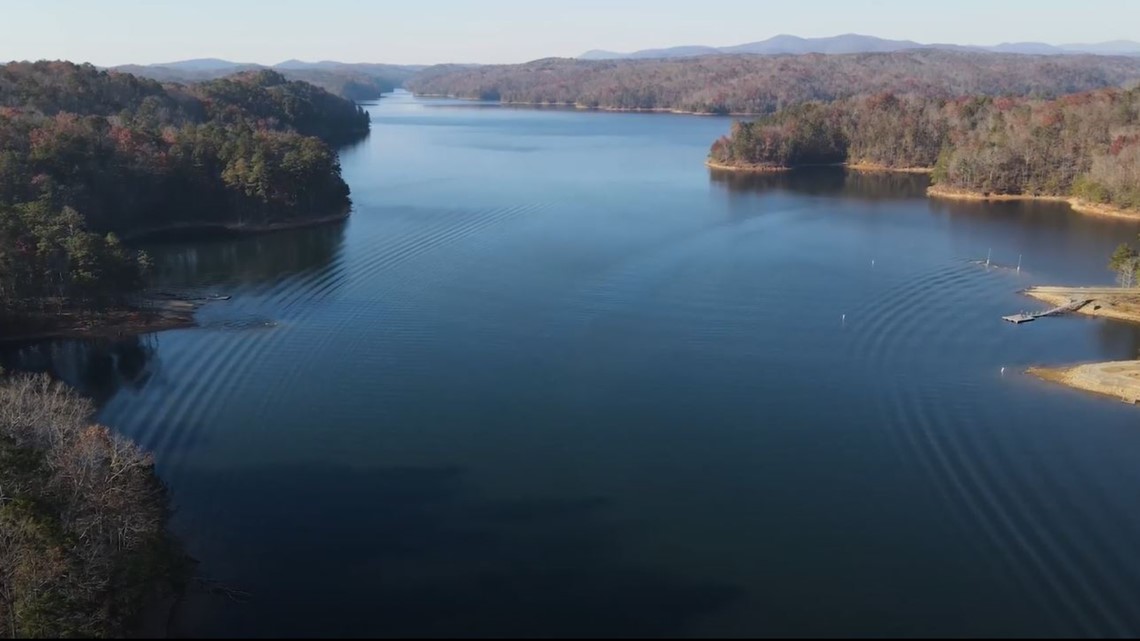
What happens next
This past October, the Environmental Protection Agency (EPA) announced a three-year plan to address PFAS, which includes drinking water standards for the first time.
The EPA is also creating rules to stop companies from dumping PFAS into waterways, launching a national testing strategy, publishing toxicity assessments of PFAS chemicals and studying PFAS in fish.
“We are acting with a sense of urgency,” Michael Regan, the EPA administrator, said in an interview with NBC News. “I’ve seen firsthand the exposure from these chemical compounds and what it does to a family’s confidence, what it does to a mother who is concerned about the long-term impacts."
President Biden’s Infrastructure Investment and Jobs Act (“Act”) includes about $10 billion dollars in grants for water utilities to help test and treat for the chemical, too. That includes about $1 billion is set aside specifically to address PFAS in wastewater discharge concerns in rural communities.

